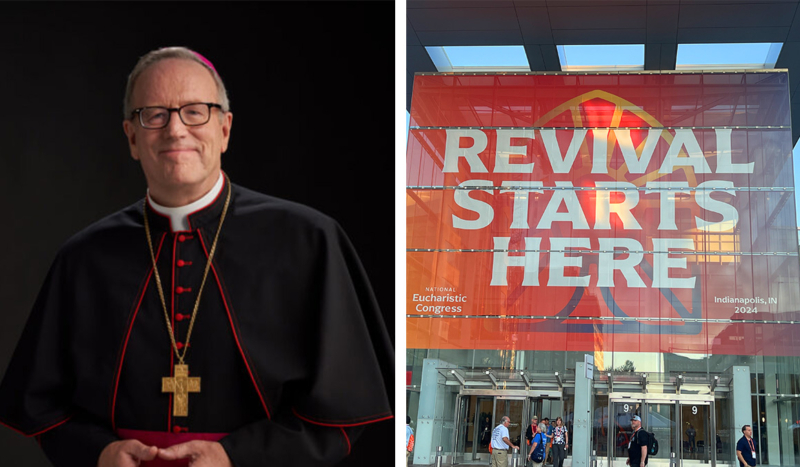
Bishop Robert Barron by Diegobcardenas / Wikimedia Commons (Left), Eucharistic Congress Welcome Banner (Right)
CV NEWS FEED // In a July 23 article published on the Word on Fire website, Bishop Robert Barron made the “provocative claim” that liberal Catholicism could never have achieved the success of the recent National Eucharistic Congress.
Bishop Barron began his letter by conveying his profound admiration for the event, describing it as one of the most significant experiences in his 38 years of priesthood.
He noted that although he had addressed large crowds before, this particular gathering of 50,000 was the largest by far and was particularly overwhelming.
The Bishop emphasized that the Eucharistic procession on Saturday, July 20, was the most impactful part of the event for him. The sight of clergy, seminarians, and nuns marching through downtown Indianapolis and receiving enthusiastic support from thousands of the faithful, all in a heartfelt expression of devotion to Jesus in the Blessed Sacrament, was particularly moving.
He attributed this significant success of the Congress to its being “predicated upon the supernatural,” rather than just on practical elements like planning or communication.
Bishop Barron noted that the event’s profound impact came from its focus on the “unnerving” mystery of the Eucharist, where Jesus is truly present in the forms of bread and wine. “It makes sense only from a supernatural perspective,” he wrote.
According to the Bishop, this fact is what led him to claim that “liberal Catholicism could never have pulled off what happened in Indianapolis.”
Given that the expression is somewhat ambiguous, Bishop Barron provided his definition of liberalism in religion: “the tendency to reduce the supernatural to the natural.”
Bishop Barron reflected on his experience with liberal Catholicism, which often framed Christian doctrines in terms of anthropology, psychology, and politics. During his school years, he might have described religion as focusing on social justice or personal adjustment and generosity.
Granting that these are valuable concerns, the Bishop argued that when faith is limited to such secular concerns, it risks becoming merely a pale reflection of secular values, leading to diminished interest among the faithful.
“And this is why liberal Catholicism has never generated the kind of energy and enthusiasm that I saw in Indianapolis,” he wrote.
Bishop Barron illustrated his point by highlighting the significant impact of having many religious and priests in traditional habits at the Congress. He noted that the visibility of these distinctive garments, particularly the “magnetic” presence of smiling, habited nuns, was striking to attendees, including the younger generation.
Reflecting on his seminary days, he mentioned that the liberal trend of the time discouraged such distinctive dress, which led to a sharp decline in vocations among those who abandoned traditional attire.
In conclusion, Bishop Barron addressed a potential critique that his emphasis on the supernatural might foster a harmful “other-worldliness” and neglect the suffering of those around us.
Bishop Barron responded to this potential critique by explaining one of his favorite photos from the Congress, depicting “two young, habited nuns sitting on the sidewalk with a homeless person, laughing and sharing food with him.” He argued that as exemplified by these sisters, a true focus on the supernatural deepens one’s dedication to improving and uplifting the natural world.
“Three enthusiastic cheers for all those who planned and participated in the Eucharistic Congress,” Bishop Barron concluded. “And God bless them for allowing the spirit of the supernatural to breathe through the proceedings.”

